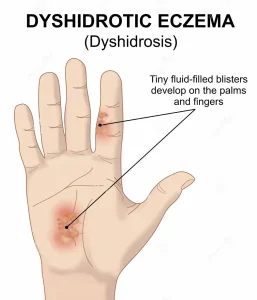Overview
Diagnosis
Dyshidrosis, also known as dyshidrotic eczema, is typically diagnosed based on the appearance of the skin and the pattern of symptoms. A dermatologist can usually identify the condition through a physical examination of the hands, fingers, and feet where small, fluid-filled blisters often appear.
There are no specific laboratory tests for dyshidrosis, but certain diagnostic steps may be used to rule out other skin conditions or identify triggers:
-
Medical history review: The doctor may ask about allergies, exposure to irritants, or family history of eczema or asthma.
-
Skin examination: The affected skin areas are closely inspected to determine if the symptoms match dyshidrotic eczema.
-
Patch testing: This may be done to check for allergic reactions that could be triggering the blisters.
-
Skin biopsy: In uncertain cases, a small skin sample may be taken for microscopic analysis to confirm the diagnosis and rule out fungal infections or other eczema types.
Since dyshidrosis can resemble contact dermatitis or fungal infections, accurate diagnosis is essential for effective management.
Treatment
The goal of treatment for dyshidrosis is to reduce inflammation, relieve itching, and prevent future flare-ups. The treatment plan depends on the severity of the condition and how often symptoms recur.
Topical treatments
-
Corticosteroid creams or ointments are often prescribed to control inflammation and itching.
-
Calcineurin inhibitors such as tacrolimus or pimecrolimus may be used as alternatives to steroids, especially for long-term management.
-
Moisturizers and emollients help keep the skin hydrated and reduce irritation.
Systemic treatments
-
For severe or persistent cases, oral corticosteroids may be prescribed for a short duration.
-
Antihistamines can help relieve itching and improve comfort.
-
In cases not responding to topical therapies, oral immunosuppressive medications may be considered under specialist supervision.
Procedures and therapies
-
Wet compresses or cool soaks can soothe the blisters and reduce discomfort.
-
Phototherapy, which uses controlled exposure to ultraviolet light, can be helpful for chronic dyshidrosis.
Home care and prevention tips
-
Avoid frequent hand washing with harsh soaps and minimize contact with detergents and cleaning chemicals.
-
Wear gloves when working with water or irritants, but avoid prolonged use of occlusive gloves that trap moisture.
-
Keep hands and feet moisturized regularly.
-
Manage stress, as it is known to trigger or worsen dyshidrotic flare-ups.
-
Avoid known allergens or triggers, such as nickel or cobalt, which can cause allergic reactions in some individuals.
With proper treatment and trigger management, dyshidrosis can usually be controlled effectively, reducing the frequency and severity of flare-ups over time.
Advertisement

